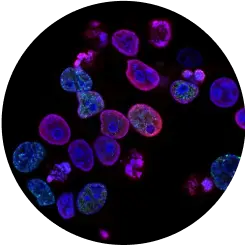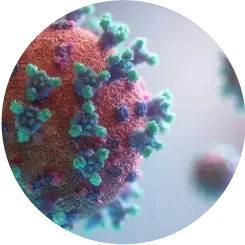How Sepsis Works

01/Infection Entry
Sepsis typically begins with an infection, often bacterial, spreading through the bloodstream

02/Inflammatory Response
The body's immune system reacts to the infection, triggering a widespread inflammatory response

03/Organ Dysfunction
The excessive inflammation can lead to dysfunction in various organs, such as the heart, lungs, kidneys, and liver

How Sepsis Works

01/Infection Entry
Sepsis typically begins with an infection, often bacterial, spreading through the bloodstream

02/Inflammatory Response
The body's immune system reacts to the infection, triggering a widespread inflammatory response

03/Organ Dysfunction
The excessive inflammation can lead to dysfunction in various organs, such as the heart, lungs, kidneys, and liver

1 in 5 deaths
in the world is attributed to sepsis
49 millions cases
of sepsis annually compared to 18 million cases of cancer annually
No drugs approved
to treat the underlying causes of sepsis
11 millions deaths
worldwide - compared to 9 millions deaths from cancer
Leading cause of death
in children under 5 years old
Treatment relies solely
on anti microbials (most antibiotics)


1 in 5 deaths
in the world is attributed to sepsis
49 millions cases
of sepsis annually compared to 18 million cases of cancer annually
No drugs approved
to treat the underlying causes of sepsis
11 millions deaths
worldwide - compared to 9 millions deaths from cancer
Leading cause of death
in children under 5 years old
Treatment relies solely
on anti microbials (most antibiotics)
Antibiotics the last drug that can be used
to treat the infection
Over-dependence and misuse of antibiotics driving antimicrobial resistance.
Symptoms include: a high temperature (fever) or low body temperature; a change in mental state – like confusion or disorientation; slurred speech; cold, clammy and pale or mottled skin; a fast heartbeat; fast breathing; chills and shivering; severe muscle pain; feeling dizzy or faint.
Frequently Asked Questions
What to ask if you or a loved one have been diagnosed with Sepsis?
What is sepsis, and how did I contract it?
Sepsis is a severe illness resulting from the body's overwhelming response to an infection, which can lead to tissue damage, organ failure, and death if not treated promptly. It typically occurs when an infection spreads throughout the body, triggering a systemic inflammatory response. Common sources of infection leading to sepsis include pneumonia, urinary tract infections, abdominal infections, and skin infections. Factors such as a weakened immune system, chronic medical conditions, recent surgery, or invasive medical procedures can increase the risk of contracting sepsis. Early recognition and prompt treatment are critical in managing sepsis and improving outcomes.
What are the immediate and long-term effects of sepsis on my body?
The immediate effects of sepsis can include organ dysfunction, shock, and reduced blood flow to vital organs, potentially leading to multiple organ failure and death if not treated promptly. Long-term effects may vary depending on the severity of the illness and the effectiveness of treatment but can include physical weakness, cognitive impairment, post-traumatic stress disorder (PTSD), chronic pain, and an increased risk of future infections or complications. Recovery from sepsis can be prolonged and may require rehabilitation and ongoing medical care to address these long-term effects and improve overall quality of life.
What treatments will I undergo, and what is the expected recovery timeline?
Treatment for sepsis typically involves antibiotics to target the underlying infection, intravenous fluids to maintain blood pressure, and supportive care such as oxygen therapy and mechanical ventilation if necessary. Depending on the severity of the condition, additional interventions like vasopressor medications to support blood pressure may be required. The recovery timeline varies greatly depending on individual factors, including the extent of organ damage, overall health, and the timeliness of treatment. While some patients may recover fully within a few weeks, others may experience prolonged recovery periods spanning months or even years, with ongoing rehabilitation and medical follow-up often necessary.
Are there any lifestyle changes or precautions I need to take post-sepsis recovery?
Following sepsis recovery, it's essential to prioritize maintaining a healthy lifestyle, including regular exercise, a balanced diet, and adequate rest to support overall well-being and immune function. Depending on individual circumstances, healthcare providers may recommend specific lifestyle modifications, such as quitting smoking, managing chronic conditions like diabetes or hypertension, and staying up-to-date with vaccinations to prevent future infections. It's crucial to attend follow-up appointments with healthcare providers to monitor any lingering effects of sepsis and address any ongoing medical needs or concerns. Additionally, practicing good hygiene, including regular handwashing, can help reduce the risk of infections and support a healthy recovery post-sepsis.
How can I recognize early signs of infection to prevent a recurrence of sepsis?
Recognizing early signs of infection is crucial for preventing sepsis recurrence. Stay vigilant for symptoms like fever, chills, rapid breathing or heart rate, confusion, or extreme pain. Monitor any wounds or injuries for signs of infection, such as redness, swelling, warmth, or discharge. Seek prompt medical attention if you suspect an infection or if symptoms worsen rapidly. It's important to follow any treatment plans provided by healthcare providers and to communicate any concerns promptly to prevent infections from progressing to sepsis.
Can sepsis be prevented?
Sepsis prevention starts with good hygiene, like regular handwashing. Vaccinations can also help prevent infections that lead to sepsis. Prompt treatment of infections reduces the risk of sepsis development. Managing chronic conditions effectively can lower susceptibility to infections. Education about sepsis symptoms empowers individuals to seek timely medical help when needed.
How does sepsis affect different age groups, such as infants, children, adults, and the elderly?
Sepsis can affect individuals of all ages, but its impact varies across age groups. In infants, sepsis may present with symptoms like fever, lethargy, and poor feeding. Children may exhibit similar symptoms but can also experience rapid breathing and altered mental status. Adults commonly show signs such as fever, elevated heart rate, and confusion. The elderly are particularly vulnerable, often displaying subtle symptoms like weakness and confusion, which can be mistaken for other age-related conditions. Early recognition and treatment are crucial across all age groups to prevent severe complications.
What should I do if I suspect someone has sepsis?
If you suspect someone has sepsis, seek emergency medical care immediately. Call for an ambulance or take them to the nearest emergency department. While waiting for medical assistance, monitor their vital signs and comfort them. Do not attempt to treat sepsis at home, as it requires prompt medical intervention. Be prepared to provide information about their symptoms, medical history, and recent illnesses to healthcare professionals. Early detection and treatment are critical for improving outcomes in sepsis cases.








